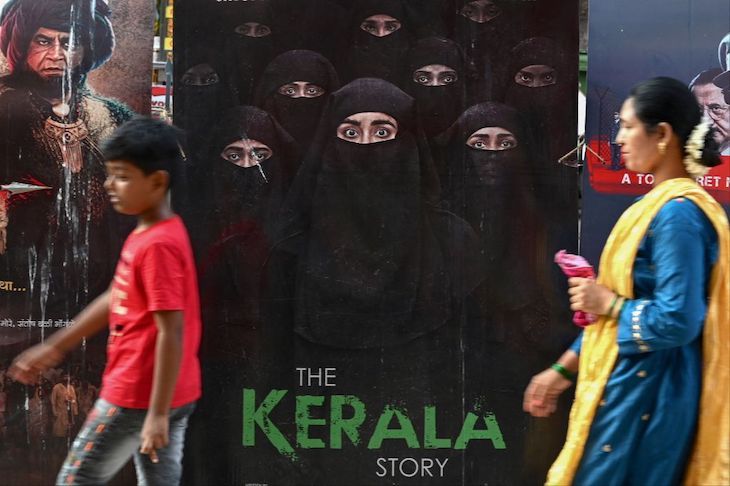Britain’s cinemas are in danger of becoming the new front line of protests from angry religious mobs demanding the cancellation of any film that meets with their disapproval. The latest disturbing example of this form of attempted censorship by diktat came when angry Muslim protesters disrupted the screening of a controversial Bollywood film in Birmingham on Friday. Their target was The Kerala Story, a film which portrays the southern Indian state — where just under a third of the population is Muslim — as a hub of Islamist terrorism and forced religious conversions. It has been condemned by some critics as crude Hindu nationalist ‘propaganda’ aimed at destroying ‘religious harmony’. Maybe, maybe not. But surely this is something that cinema audiences are entitled to decide for themselves.
The film has been dogged by controversy from the beginning. A trailer claiming that it tells the ‘heart-breaking and gut-wrenching stories of 32,000 females’ joining Isis was withdrawn after criticism that it was exaggerated, even though the filmmakers maintain their claims are based on years of research. Alt-News, an Indian fact-checking website, said it found ‘no evidence’ to support the figures. A US State Department report found that there were ’66 known Indian-origin fighters affiliated’ with Isis as of November 2020. However, the demand to ban the film from being shown in cinemas in Birmingham and across Britain is not really a dispute about facts and figures on religious conversions or the motives behind them, nor is it much to do with an argument about the scale of the terrorist threat in India. It is about the power to have the final say on what is permissible on screen when it comes to Islam.
As if the long-running dispute between India and Pakistan over the disputed territory will be resolved in Cineworld, Birmingham
The protesters were led by Shakeel Afsar, a property developer who chooses to self-identify as a Kashmiri independence activist. In a short video uploaded to 5Pillars, a British Muslim news website, Afsar is seen demanding to speak to the manager of the cinema about the ‘Islamophobic’ nature of the film. Islamophobia, in this particular definition, would appear to be anything Afsar deems it to be.
‘This film is lies,’ he claimed. ‘We will not allow it,’ a protestor can be heard yelling. Ponder that statement for a moment — what this tiny collection of activists will, or will not, allow. A free and open exchange of views is not part of the agenda. Afsar was eventually escorted out of the cinema, chanting: ‘Free Kashmir’. As if the long-running dispute between India and Pakistan over the disputed territory will be resolved in Cineworld, Birmingham. Just as divorced from the real world is Muslim Engagement and Development, described as an advocacy group, which encouraged supporters to lobby cinemas to cancel the screening of the film, claiming it would ‘no doubt fuel Islamophobic tensions and divisiveness’. Who exactly is inflaming such tensions — if indeed they exist — in this instance?
It is troubling to think that these bullying tactics might be succeeding. Afsar successfully led a campaign last year to drop The Lady of Heaven, a film about Fatimah, one of the Prophet Muhammad’s daughters, from cinemas. Hundreds of people protested at venues in Bradford, Bolton and Birmingham that were showing the film, which was quickly pulled from cinemas. It is troubling that these people feel entitled to declare themselves the final arbiters of the acceptable parameters of debate on Islam in Britain.
No one from any religious community, however insulted or hurt they might feel, can be allowed to dictate what can or cannot be seen in a cinema or indeed anywhere else. If someone of a particular religious persuasion doesn’t like a film they don’t have to watch it. Freedom of expression on religion — the right to debate religious ideas and beliefs without fear — is too important to barter away in a fruitless attempt to placate the perpetually offended. That is why Britain has resisted any attempt to introduce blasphemy laws. It should not be left to cinema chains alone to fight back against attempts to censor films on religious grounds.
Ministers and senior politicians from all parties need to take up the cudgels on behalf of basic values. People must be free to choose what they want to see at their local cinema and not have their choices dictated by the whims and demands of angry religious protesters.
Got something to add? Join the discussion and comment below.
Get 10 issues for just $10
Subscribe to The Spectator Australia today for the next 10 magazine issues, plus full online access, for just $10.




















Comments
Don't miss out
Join the conversation with other Spectator Australia readers. Subscribe to leave a comment.
SUBSCRIBEAlready a subscriber? Log in